MM200 Alibaba Group Sustainability Report 2022
VerifiedAdded on 2022/10/13
|11
|3342
|16
AI Summary
Contribute Materials
Your contribution can guide someone’s learning journey. Share your
documents today.
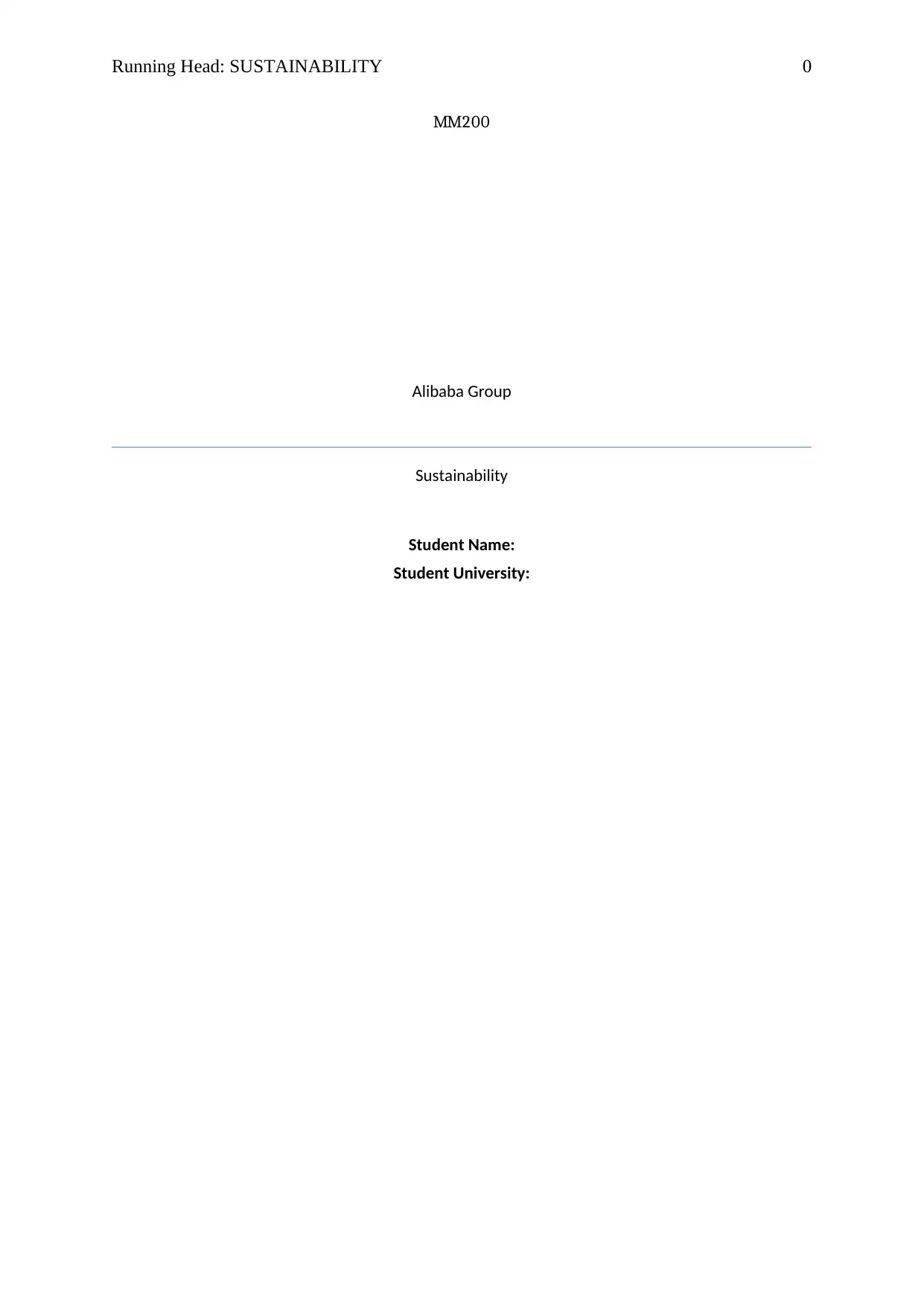
Running Head: SUSTAINABILITY 0
MM200
Alibaba Group
Sustainability
Student Name:
Student University:
MM200
Alibaba Group
Sustainability
Student Name:
Student University:
Secure Best Marks with AI Grader
Need help grading? Try our AI Grader for instant feedback on your assignments.
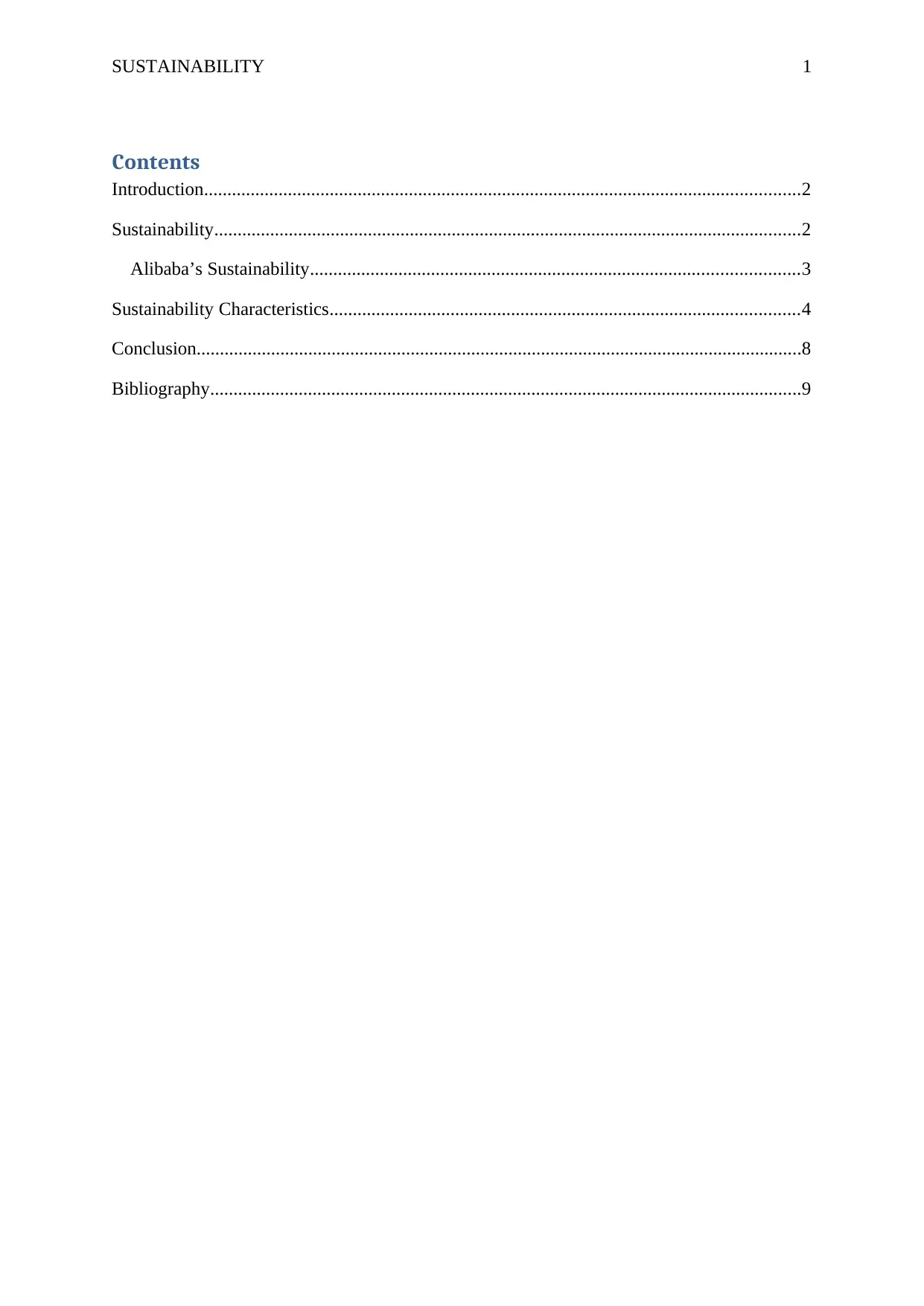
SUSTAINABILITY 1
Contents
Introduction................................................................................................................................2
Sustainability..............................................................................................................................2
Alibaba’s Sustainability.........................................................................................................3
Sustainability Characteristics.....................................................................................................4
Conclusion..................................................................................................................................8
Bibliography...............................................................................................................................9
Contents
Introduction................................................................................................................................2
Sustainability..............................................................................................................................2
Alibaba’s Sustainability.........................................................................................................3
Sustainability Characteristics.....................................................................................................4
Conclusion..................................................................................................................................8
Bibliography...............................................................................................................................9
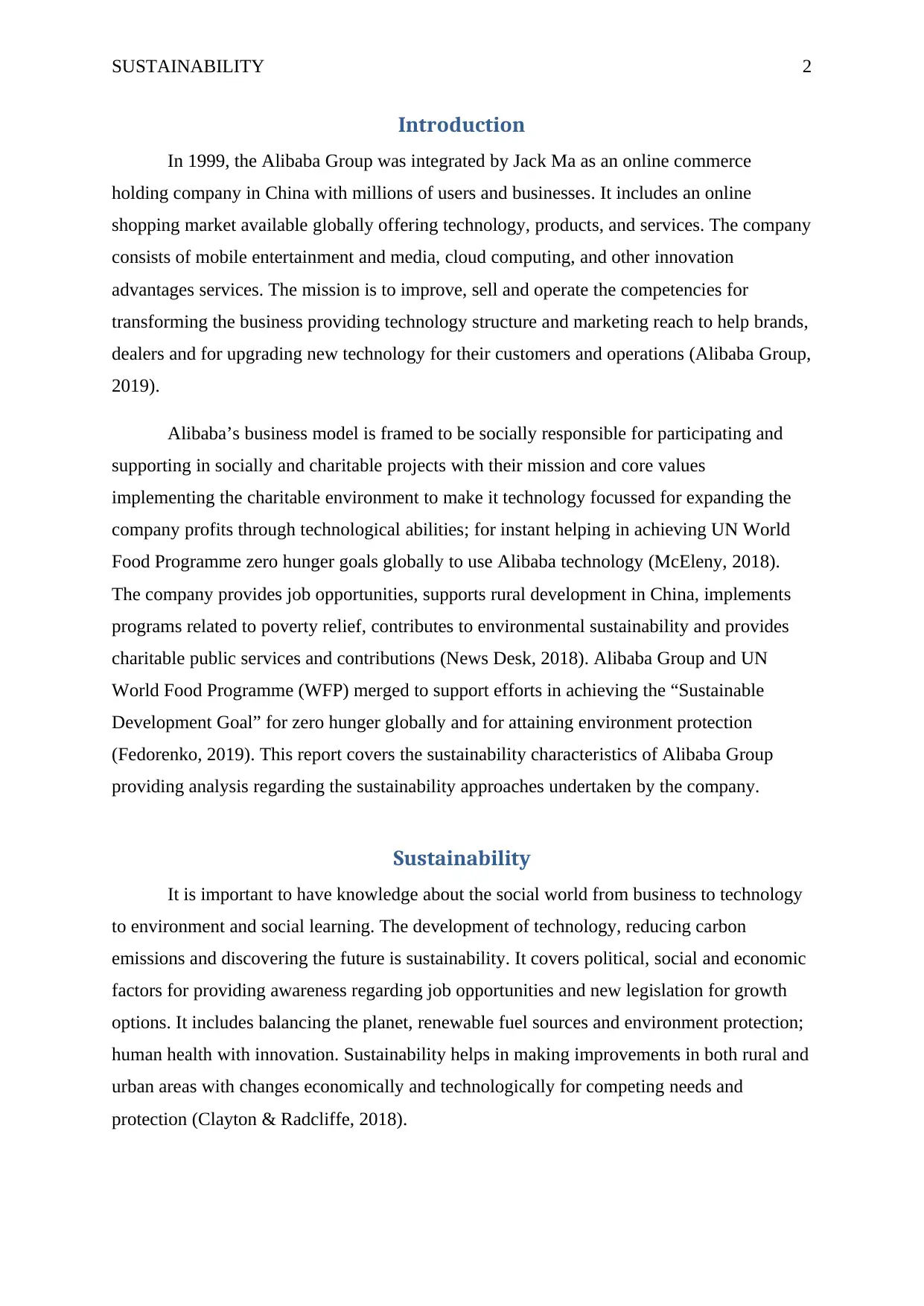
SUSTAINABILITY 2
Introduction
In 1999, the Alibaba Group was integrated by Jack Ma as an online commerce
holding company in China with millions of users and businesses. It includes an online
shopping market available globally offering technology, products, and services. The company
consists of mobile entertainment and media, cloud computing, and other innovation
advantages services. The mission is to improve, sell and operate the competencies for
transforming the business providing technology structure and marketing reach to help brands,
dealers and for upgrading new technology for their customers and operations (Alibaba Group,
2019).
Alibaba’s business model is framed to be socially responsible for participating and
supporting in socially and charitable projects with their mission and core values
implementing the charitable environment to make it technology focussed for expanding the
company profits through technological abilities; for instant helping in achieving UN World
Food Programme zero hunger goals globally to use Alibaba technology (McEleny, 2018).
The company provides job opportunities, supports rural development in China, implements
programs related to poverty relief, contributes to environmental sustainability and provides
charitable public services and contributions (News Desk, 2018). Alibaba Group and UN
World Food Programme (WFP) merged to support efforts in achieving the “Sustainable
Development Goal” for zero hunger globally and for attaining environment protection
(Fedorenko, 2019). This report covers the sustainability characteristics of Alibaba Group
providing analysis regarding the sustainability approaches undertaken by the company.
Sustainability
It is important to have knowledge about the social world from business to technology
to environment and social learning. The development of technology, reducing carbon
emissions and discovering the future is sustainability. It covers political, social and economic
factors for providing awareness regarding job opportunities and new legislation for growth
options. It includes balancing the planet, renewable fuel sources and environment protection;
human health with innovation. Sustainability helps in making improvements in both rural and
urban areas with changes economically and technologically for competing needs and
protection (Clayton & Radcliffe, 2018).
Introduction
In 1999, the Alibaba Group was integrated by Jack Ma as an online commerce
holding company in China with millions of users and businesses. It includes an online
shopping market available globally offering technology, products, and services. The company
consists of mobile entertainment and media, cloud computing, and other innovation
advantages services. The mission is to improve, sell and operate the competencies for
transforming the business providing technology structure and marketing reach to help brands,
dealers and for upgrading new technology for their customers and operations (Alibaba Group,
2019).
Alibaba’s business model is framed to be socially responsible for participating and
supporting in socially and charitable projects with their mission and core values
implementing the charitable environment to make it technology focussed for expanding the
company profits through technological abilities; for instant helping in achieving UN World
Food Programme zero hunger goals globally to use Alibaba technology (McEleny, 2018).
The company provides job opportunities, supports rural development in China, implements
programs related to poverty relief, contributes to environmental sustainability and provides
charitable public services and contributions (News Desk, 2018). Alibaba Group and UN
World Food Programme (WFP) merged to support efforts in achieving the “Sustainable
Development Goal” for zero hunger globally and for attaining environment protection
(Fedorenko, 2019). This report covers the sustainability characteristics of Alibaba Group
providing analysis regarding the sustainability approaches undertaken by the company.
Sustainability
It is important to have knowledge about the social world from business to technology
to environment and social learning. The development of technology, reducing carbon
emissions and discovering the future is sustainability. It covers political, social and economic
factors for providing awareness regarding job opportunities and new legislation for growth
options. It includes balancing the planet, renewable fuel sources and environment protection;
human health with innovation. Sustainability helps in making improvements in both rural and
urban areas with changes economically and technologically for competing needs and
protection (Clayton & Radcliffe, 2018).
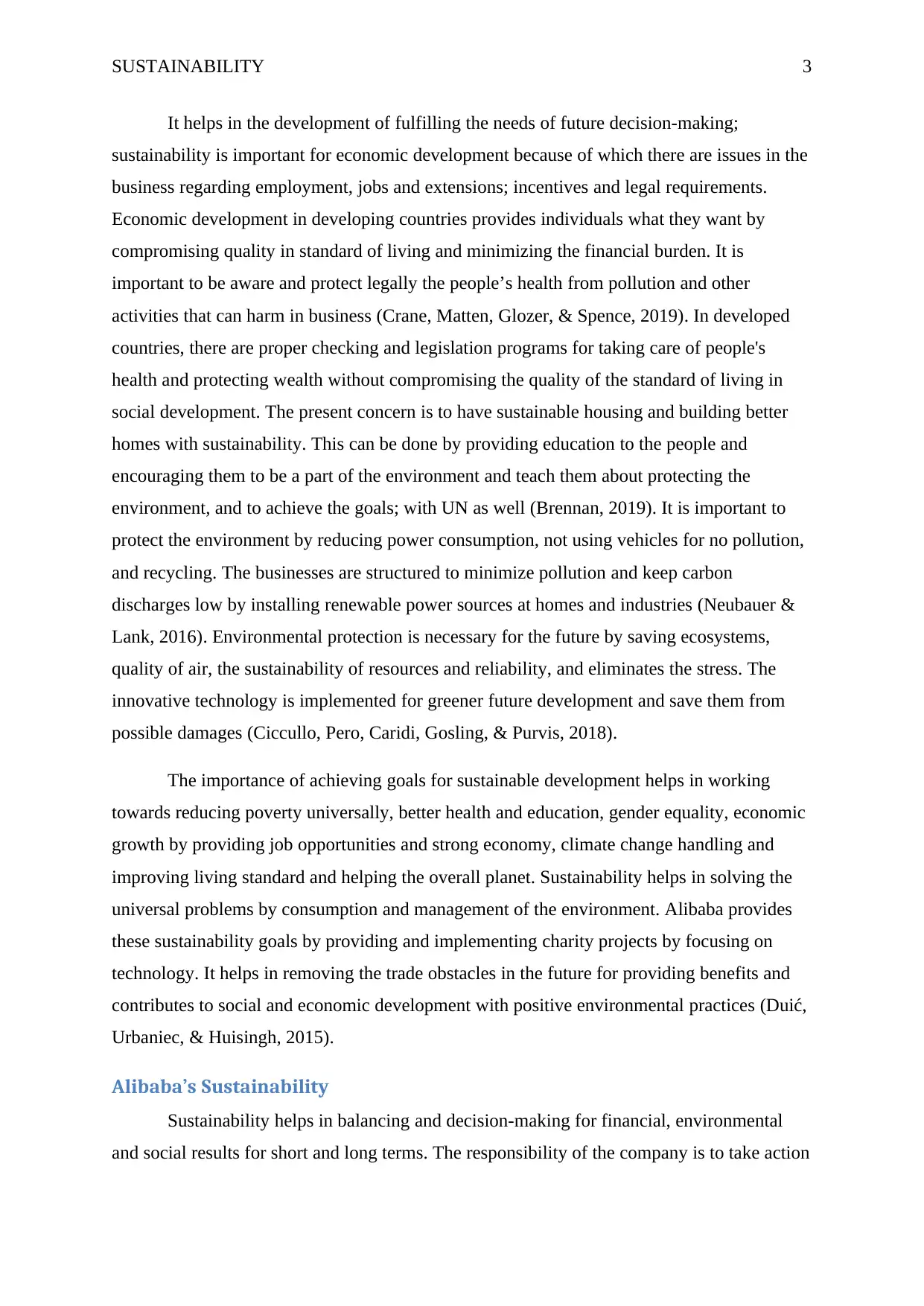
SUSTAINABILITY 3
It helps in the development of fulfilling the needs of future decision-making;
sustainability is important for economic development because of which there are issues in the
business regarding employment, jobs and extensions; incentives and legal requirements.
Economic development in developing countries provides individuals what they want by
compromising quality in standard of living and minimizing the financial burden. It is
important to be aware and protect legally the people’s health from pollution and other
activities that can harm in business (Crane, Matten, Glozer, & Spence, 2019). In developed
countries, there are proper checking and legislation programs for taking care of people's
health and protecting wealth without compromising the quality of the standard of living in
social development. The present concern is to have sustainable housing and building better
homes with sustainability. This can be done by providing education to the people and
encouraging them to be a part of the environment and teach them about protecting the
environment, and to achieve the goals; with UN as well (Brennan, 2019). It is important to
protect the environment by reducing power consumption, not using vehicles for no pollution,
and recycling. The businesses are structured to minimize pollution and keep carbon
discharges low by installing renewable power sources at homes and industries (Neubauer &
Lank, 2016). Environmental protection is necessary for the future by saving ecosystems,
quality of air, the sustainability of resources and reliability, and eliminates the stress. The
innovative technology is implemented for greener future development and save them from
possible damages (Ciccullo, Pero, Caridi, Gosling, & Purvis, 2018).
The importance of achieving goals for sustainable development helps in working
towards reducing poverty universally, better health and education, gender equality, economic
growth by providing job opportunities and strong economy, climate change handling and
improving living standard and helping the overall planet. Sustainability helps in solving the
universal problems by consumption and management of the environment. Alibaba provides
these sustainability goals by providing and implementing charity projects by focusing on
technology. It helps in removing the trade obstacles in the future for providing benefits and
contributes to social and economic development with positive environmental practices (Duić,
Urbaniec, & Huisingh, 2015).
Alibaba’s Sustainability
Sustainability helps in balancing and decision-making for financial, environmental
and social results for short and long terms. The responsibility of the company is to take action
It helps in the development of fulfilling the needs of future decision-making;
sustainability is important for economic development because of which there are issues in the
business regarding employment, jobs and extensions; incentives and legal requirements.
Economic development in developing countries provides individuals what they want by
compromising quality in standard of living and minimizing the financial burden. It is
important to be aware and protect legally the people’s health from pollution and other
activities that can harm in business (Crane, Matten, Glozer, & Spence, 2019). In developed
countries, there are proper checking and legislation programs for taking care of people's
health and protecting wealth without compromising the quality of the standard of living in
social development. The present concern is to have sustainable housing and building better
homes with sustainability. This can be done by providing education to the people and
encouraging them to be a part of the environment and teach them about protecting the
environment, and to achieve the goals; with UN as well (Brennan, 2019). It is important to
protect the environment by reducing power consumption, not using vehicles for no pollution,
and recycling. The businesses are structured to minimize pollution and keep carbon
discharges low by installing renewable power sources at homes and industries (Neubauer &
Lank, 2016). Environmental protection is necessary for the future by saving ecosystems,
quality of air, the sustainability of resources and reliability, and eliminates the stress. The
innovative technology is implemented for greener future development and save them from
possible damages (Ciccullo, Pero, Caridi, Gosling, & Purvis, 2018).
The importance of achieving goals for sustainable development helps in working
towards reducing poverty universally, better health and education, gender equality, economic
growth by providing job opportunities and strong economy, climate change handling and
improving living standard and helping the overall planet. Sustainability helps in solving the
universal problems by consumption and management of the environment. Alibaba provides
these sustainability goals by providing and implementing charity projects by focusing on
technology. It helps in removing the trade obstacles in the future for providing benefits and
contributes to social and economic development with positive environmental practices (Duić,
Urbaniec, & Huisingh, 2015).
Alibaba’s Sustainability
Sustainability helps in balancing and decision-making for financial, environmental
and social results for short and long terms. The responsibility of the company is to take action
Secure Best Marks with AI Grader
Need help grading? Try our AI Grader for instant feedback on your assignments.
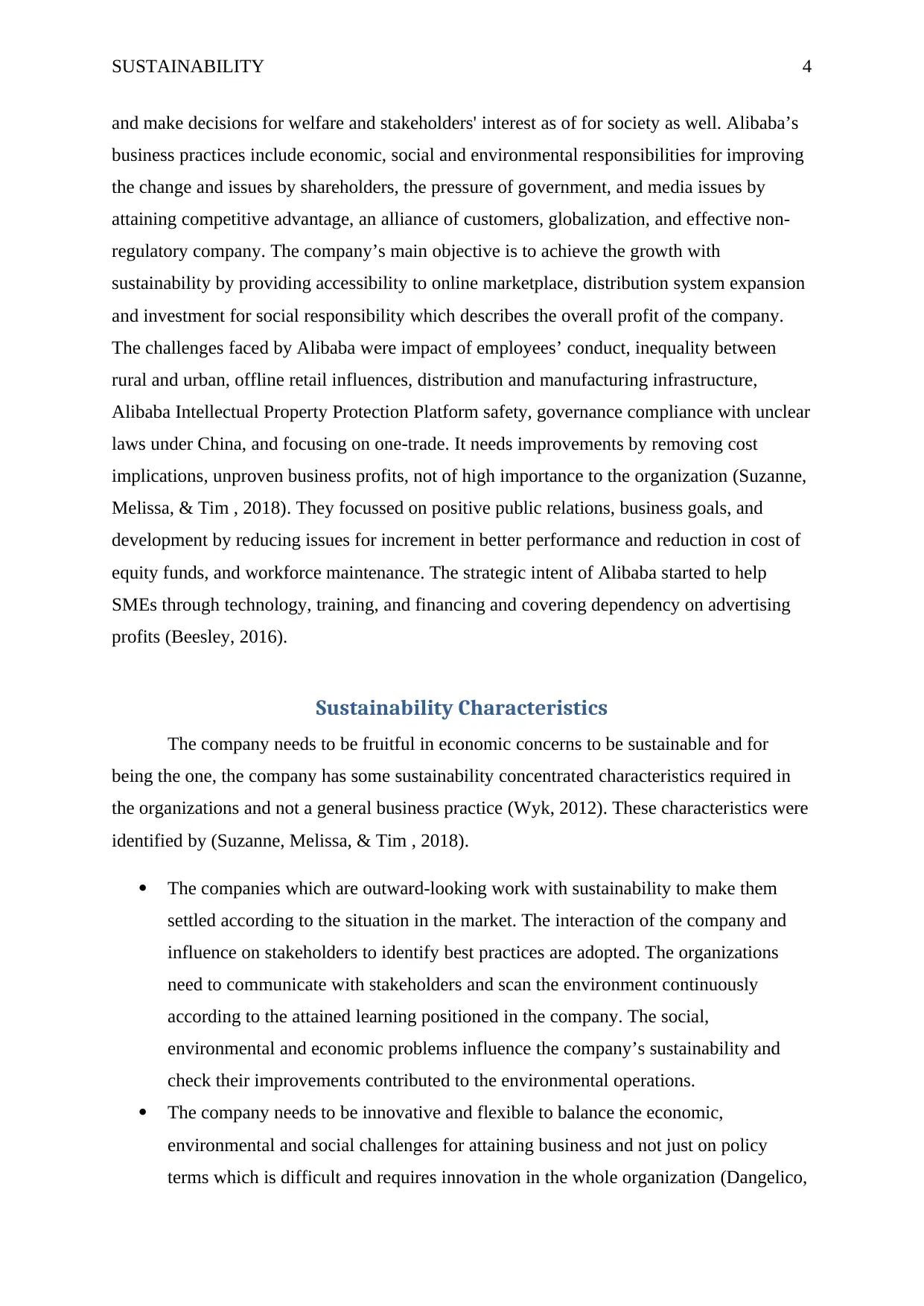
SUSTAINABILITY 4
and make decisions for welfare and stakeholders' interest as of for society as well. Alibaba’s
business practices include economic, social and environmental responsibilities for improving
the change and issues by shareholders, the pressure of government, and media issues by
attaining competitive advantage, an alliance of customers, globalization, and effective non-
regulatory company. The company’s main objective is to achieve the growth with
sustainability by providing accessibility to online marketplace, distribution system expansion
and investment for social responsibility which describes the overall profit of the company.
The challenges faced by Alibaba were impact of employees’ conduct, inequality between
rural and urban, offline retail influences, distribution and manufacturing infrastructure,
Alibaba Intellectual Property Protection Platform safety, governance compliance with unclear
laws under China, and focusing on one-trade. It needs improvements by removing cost
implications, unproven business profits, not of high importance to the organization (Suzanne,
Melissa, & Tim , 2018). They focussed on positive public relations, business goals, and
development by reducing issues for increment in better performance and reduction in cost of
equity funds, and workforce maintenance. The strategic intent of Alibaba started to help
SMEs through technology, training, and financing and covering dependency on advertising
profits (Beesley, 2016).
Sustainability Characteristics
The company needs to be fruitful in economic concerns to be sustainable and for
being the one, the company has some sustainability concentrated characteristics required in
the organizations and not a general business practice (Wyk, 2012). These characteristics were
identified by (Suzanne, Melissa, & Tim , 2018).
The companies which are outward-looking work with sustainability to make them
settled according to the situation in the market. The interaction of the company and
influence on stakeholders to identify best practices are adopted. The organizations
need to communicate with stakeholders and scan the environment continuously
according to the attained learning positioned in the company. The social,
environmental and economic problems influence the company’s sustainability and
check their improvements contributed to the environmental operations.
The company needs to be innovative and flexible to balance the economic,
environmental and social challenges for attaining business and not just on policy
terms which is difficult and requires innovation in the whole organization (Dangelico,
and make decisions for welfare and stakeholders' interest as of for society as well. Alibaba’s
business practices include economic, social and environmental responsibilities for improving
the change and issues by shareholders, the pressure of government, and media issues by
attaining competitive advantage, an alliance of customers, globalization, and effective non-
regulatory company. The company’s main objective is to achieve the growth with
sustainability by providing accessibility to online marketplace, distribution system expansion
and investment for social responsibility which describes the overall profit of the company.
The challenges faced by Alibaba were impact of employees’ conduct, inequality between
rural and urban, offline retail influences, distribution and manufacturing infrastructure,
Alibaba Intellectual Property Protection Platform safety, governance compliance with unclear
laws under China, and focusing on one-trade. It needs improvements by removing cost
implications, unproven business profits, not of high importance to the organization (Suzanne,
Melissa, & Tim , 2018). They focussed on positive public relations, business goals, and
development by reducing issues for increment in better performance and reduction in cost of
equity funds, and workforce maintenance. The strategic intent of Alibaba started to help
SMEs through technology, training, and financing and covering dependency on advertising
profits (Beesley, 2016).
Sustainability Characteristics
The company needs to be fruitful in economic concerns to be sustainable and for
being the one, the company has some sustainability concentrated characteristics required in
the organizations and not a general business practice (Wyk, 2012). These characteristics were
identified by (Suzanne, Melissa, & Tim , 2018).
The companies which are outward-looking work with sustainability to make them
settled according to the situation in the market. The interaction of the company and
influence on stakeholders to identify best practices are adopted. The organizations
need to communicate with stakeholders and scan the environment continuously
according to the attained learning positioned in the company. The social,
environmental and economic problems influence the company’s sustainability and
check their improvements contributed to the environmental operations.
The company needs to be innovative and flexible to balance the economic,
environmental and social challenges for attaining business and not just on policy
terms which is difficult and requires innovation in the whole organization (Dangelico,
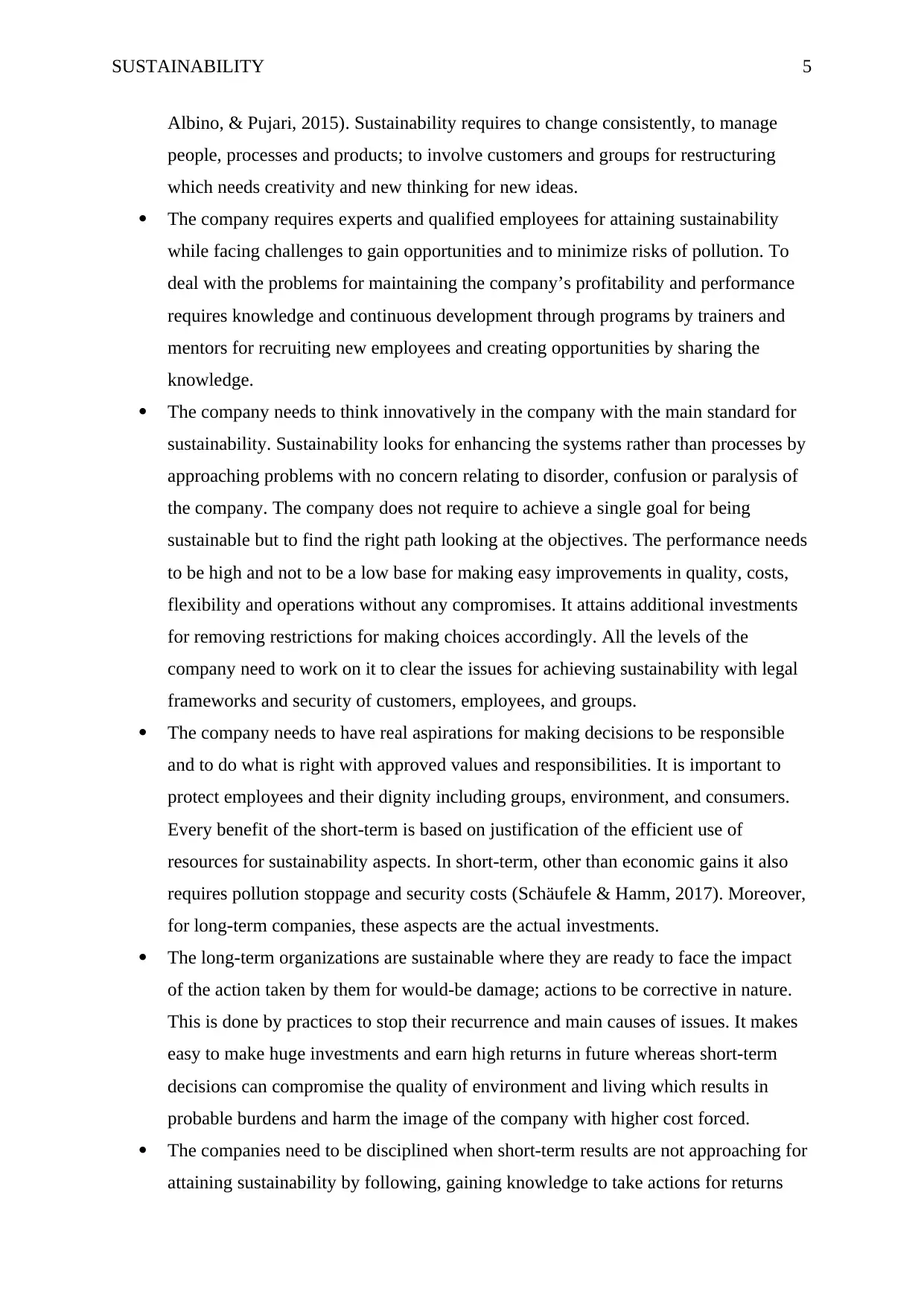
SUSTAINABILITY 5
Albino, & Pujari, 2015). Sustainability requires to change consistently, to manage
people, processes and products; to involve customers and groups for restructuring
which needs creativity and new thinking for new ideas.
The company requires experts and qualified employees for attaining sustainability
while facing challenges to gain opportunities and to minimize risks of pollution. To
deal with the problems for maintaining the company’s profitability and performance
requires knowledge and continuous development through programs by trainers and
mentors for recruiting new employees and creating opportunities by sharing the
knowledge.
The company needs to think innovatively in the company with the main standard for
sustainability. Sustainability looks for enhancing the systems rather than processes by
approaching problems with no concern relating to disorder, confusion or paralysis of
the company. The company does not require to achieve a single goal for being
sustainable but to find the right path looking at the objectives. The performance needs
to be high and not to be a low base for making easy improvements in quality, costs,
flexibility and operations without any compromises. It attains additional investments
for removing restrictions for making choices accordingly. All the levels of the
company need to work on it to clear the issues for achieving sustainability with legal
frameworks and security of customers, employees, and groups.
The company needs to have real aspirations for making decisions to be responsible
and to do what is right with approved values and responsibilities. It is important to
protect employees and their dignity including groups, environment, and consumers.
Every benefit of the short-term is based on justification of the efficient use of
resources for sustainability aspects. In short-term, other than economic gains it also
requires pollution stoppage and security costs (Schäufele & Hamm, 2017). Moreover,
for long-term companies, these aspects are the actual investments.
The long-term organizations are sustainable where they are ready to face the impact
of the action taken by them for would-be damage; actions to be corrective in nature.
This is done by practices to stop their recurrence and main causes of issues. It makes
easy to make huge investments and earn high returns in future whereas short-term
decisions can compromise the quality of environment and living which results in
probable burdens and harm the image of the company with higher cost forced.
The companies need to be disciplined when short-term results are not approaching for
attaining sustainability by following, gaining knowledge to take actions for returns
Albino, & Pujari, 2015). Sustainability requires to change consistently, to manage
people, processes and products; to involve customers and groups for restructuring
which needs creativity and new thinking for new ideas.
The company requires experts and qualified employees for attaining sustainability
while facing challenges to gain opportunities and to minimize risks of pollution. To
deal with the problems for maintaining the company’s profitability and performance
requires knowledge and continuous development through programs by trainers and
mentors for recruiting new employees and creating opportunities by sharing the
knowledge.
The company needs to think innovatively in the company with the main standard for
sustainability. Sustainability looks for enhancing the systems rather than processes by
approaching problems with no concern relating to disorder, confusion or paralysis of
the company. The company does not require to achieve a single goal for being
sustainable but to find the right path looking at the objectives. The performance needs
to be high and not to be a low base for making easy improvements in quality, costs,
flexibility and operations without any compromises. It attains additional investments
for removing restrictions for making choices accordingly. All the levels of the
company need to work on it to clear the issues for achieving sustainability with legal
frameworks and security of customers, employees, and groups.
The company needs to have real aspirations for making decisions to be responsible
and to do what is right with approved values and responsibilities. It is important to
protect employees and their dignity including groups, environment, and consumers.
Every benefit of the short-term is based on justification of the efficient use of
resources for sustainability aspects. In short-term, other than economic gains it also
requires pollution stoppage and security costs (Schäufele & Hamm, 2017). Moreover,
for long-term companies, these aspects are the actual investments.
The long-term organizations are sustainable where they are ready to face the impact
of the action taken by them for would-be damage; actions to be corrective in nature.
This is done by practices to stop their recurrence and main causes of issues. It makes
easy to make huge investments and earn high returns in future whereas short-term
decisions can compromise the quality of environment and living which results in
probable burdens and harm the image of the company with higher cost forced.
The companies need to be disciplined when short-term results are not approaching for
attaining sustainability by following, gaining knowledge to take actions for returns
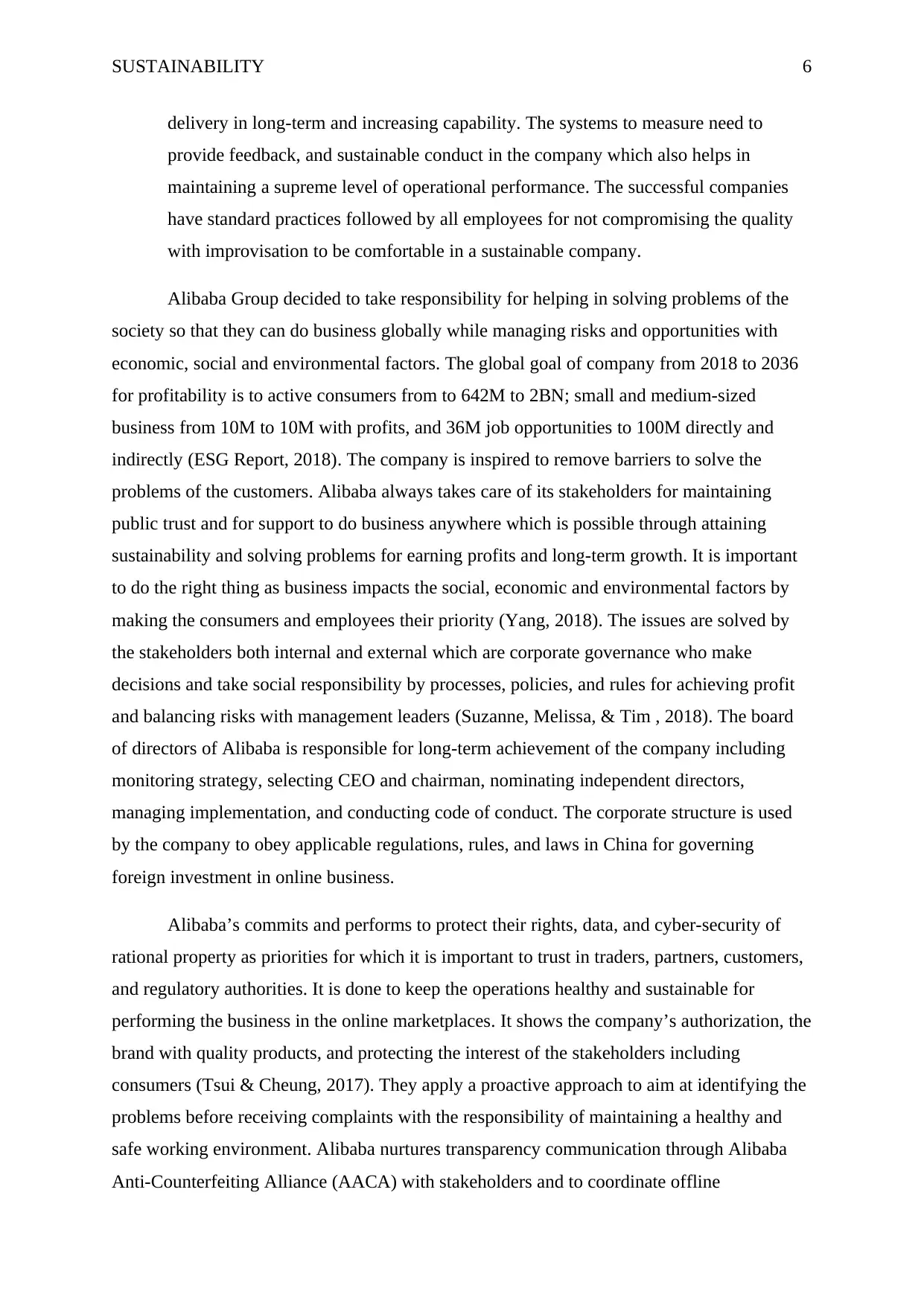
SUSTAINABILITY 6
delivery in long-term and increasing capability. The systems to measure need to
provide feedback, and sustainable conduct in the company which also helps in
maintaining a supreme level of operational performance. The successful companies
have standard practices followed by all employees for not compromising the quality
with improvisation to be comfortable in a sustainable company.
Alibaba Group decided to take responsibility for helping in solving problems of the
society so that they can do business globally while managing risks and opportunities with
economic, social and environmental factors. The global goal of company from 2018 to 2036
for profitability is to active consumers from to 642M to 2BN; small and medium-sized
business from 10M to 10M with profits, and 36M job opportunities to 100M directly and
indirectly (ESG Report, 2018). The company is inspired to remove barriers to solve the
problems of the customers. Alibaba always takes care of its stakeholders for maintaining
public trust and for support to do business anywhere which is possible through attaining
sustainability and solving problems for earning profits and long-term growth. It is important
to do the right thing as business impacts the social, economic and environmental factors by
making the consumers and employees their priority (Yang, 2018). The issues are solved by
the stakeholders both internal and external which are corporate governance who make
decisions and take social responsibility by processes, policies, and rules for achieving profit
and balancing risks with management leaders (Suzanne, Melissa, & Tim , 2018). The board
of directors of Alibaba is responsible for long-term achievement of the company including
monitoring strategy, selecting CEO and chairman, nominating independent directors,
managing implementation, and conducting code of conduct. The corporate structure is used
by the company to obey applicable regulations, rules, and laws in China for governing
foreign investment in online business.
Alibaba’s commits and performs to protect their rights, data, and cyber-security of
rational property as priorities for which it is important to trust in traders, partners, customers,
and regulatory authorities. It is done to keep the operations healthy and sustainable for
performing the business in the online marketplaces. It shows the company’s authorization, the
brand with quality products, and protecting the interest of the stakeholders including
consumers (Tsui & Cheung, 2017). They apply a proactive approach to aim at identifying the
problems before receiving complaints with the responsibility of maintaining a healthy and
safe working environment. Alibaba nurtures transparency communication through Alibaba
Anti-Counterfeiting Alliance (AACA) with stakeholders and to coordinate offline
delivery in long-term and increasing capability. The systems to measure need to
provide feedback, and sustainable conduct in the company which also helps in
maintaining a supreme level of operational performance. The successful companies
have standard practices followed by all employees for not compromising the quality
with improvisation to be comfortable in a sustainable company.
Alibaba Group decided to take responsibility for helping in solving problems of the
society so that they can do business globally while managing risks and opportunities with
economic, social and environmental factors. The global goal of company from 2018 to 2036
for profitability is to active consumers from to 642M to 2BN; small and medium-sized
business from 10M to 10M with profits, and 36M job opportunities to 100M directly and
indirectly (ESG Report, 2018). The company is inspired to remove barriers to solve the
problems of the customers. Alibaba always takes care of its stakeholders for maintaining
public trust and for support to do business anywhere which is possible through attaining
sustainability and solving problems for earning profits and long-term growth. It is important
to do the right thing as business impacts the social, economic and environmental factors by
making the consumers and employees their priority (Yang, 2018). The issues are solved by
the stakeholders both internal and external which are corporate governance who make
decisions and take social responsibility by processes, policies, and rules for achieving profit
and balancing risks with management leaders (Suzanne, Melissa, & Tim , 2018). The board
of directors of Alibaba is responsible for long-term achievement of the company including
monitoring strategy, selecting CEO and chairman, nominating independent directors,
managing implementation, and conducting code of conduct. The corporate structure is used
by the company to obey applicable regulations, rules, and laws in China for governing
foreign investment in online business.
Alibaba’s commits and performs to protect their rights, data, and cyber-security of
rational property as priorities for which it is important to trust in traders, partners, customers,
and regulatory authorities. It is done to keep the operations healthy and sustainable for
performing the business in the online marketplaces. It shows the company’s authorization, the
brand with quality products, and protecting the interest of the stakeholders including
consumers (Tsui & Cheung, 2017). They apply a proactive approach to aim at identifying the
problems before receiving complaints with the responsibility of maintaining a healthy and
safe working environment. Alibaba nurtures transparency communication through Alibaba
Anti-Counterfeiting Alliance (AACA) with stakeholders and to coordinate offline
Paraphrase This Document
Need a fresh take? Get an instant paraphrase of this document with our AI Paraphraser
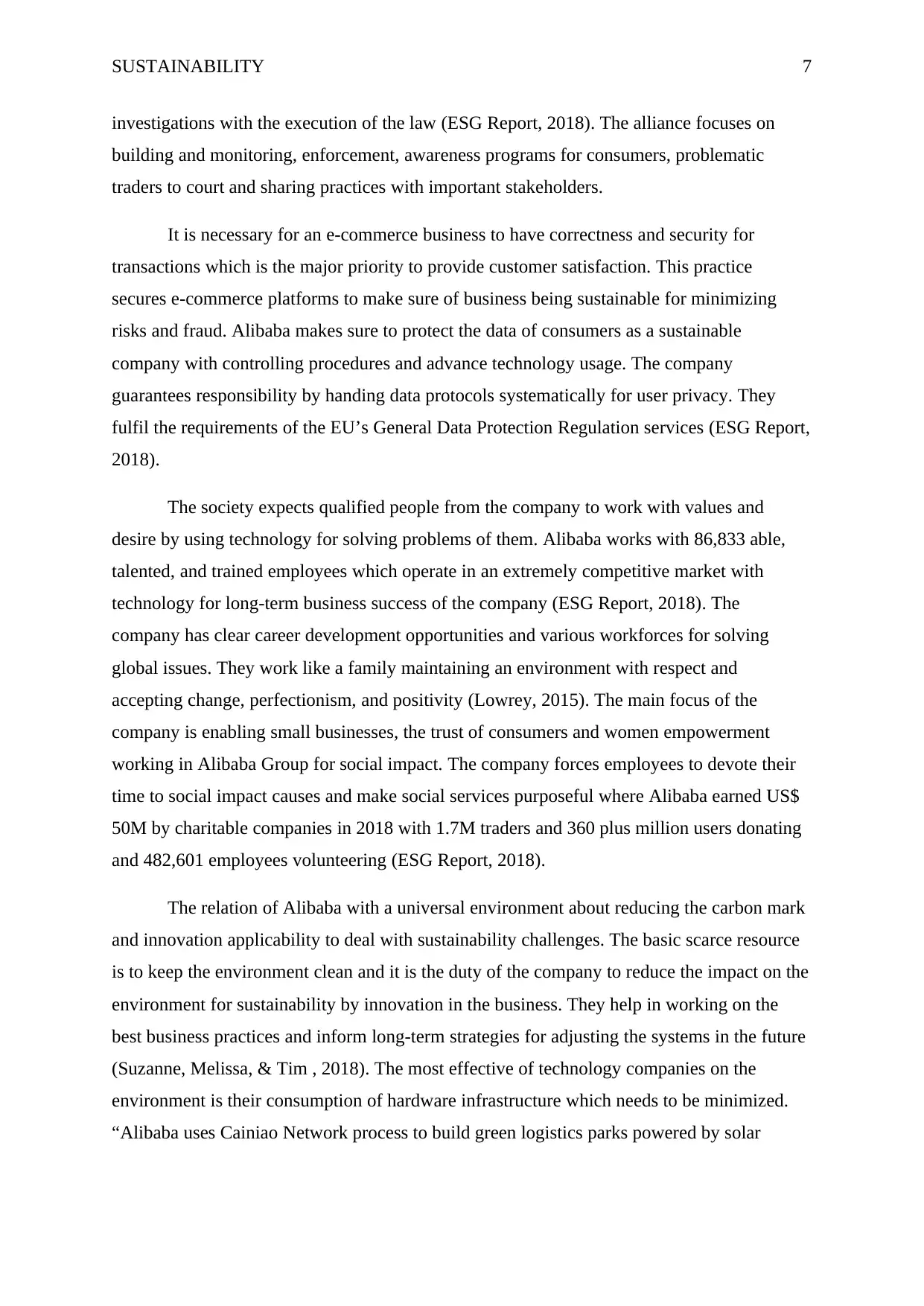
SUSTAINABILITY 7
investigations with the execution of the law (ESG Report, 2018). The alliance focuses on
building and monitoring, enforcement, awareness programs for consumers, problematic
traders to court and sharing practices with important stakeholders.
It is necessary for an e-commerce business to have correctness and security for
transactions which is the major priority to provide customer satisfaction. This practice
secures e-commerce platforms to make sure of business being sustainable for minimizing
risks and fraud. Alibaba makes sure to protect the data of consumers as a sustainable
company with controlling procedures and advance technology usage. The company
guarantees responsibility by handing data protocols systematically for user privacy. They
fulfil the requirements of the EU’s General Data Protection Regulation services (ESG Report,
2018).
The society expects qualified people from the company to work with values and
desire by using technology for solving problems of them. Alibaba works with 86,833 able,
talented, and trained employees which operate in an extremely competitive market with
technology for long-term business success of the company (ESG Report, 2018). The
company has clear career development opportunities and various workforces for solving
global issues. They work like a family maintaining an environment with respect and
accepting change, perfectionism, and positivity (Lowrey, 2015). The main focus of the
company is enabling small businesses, the trust of consumers and women empowerment
working in Alibaba Group for social impact. The company forces employees to devote their
time to social impact causes and make social services purposeful where Alibaba earned US$
50M by charitable companies in 2018 with 1.7M traders and 360 plus million users donating
and 482,601 employees volunteering (ESG Report, 2018).
The relation of Alibaba with a universal environment about reducing the carbon mark
and innovation applicability to deal with sustainability challenges. The basic scarce resource
is to keep the environment clean and it is the duty of the company to reduce the impact on the
environment for sustainability by innovation in the business. They help in working on the
best business practices and inform long-term strategies for adjusting the systems in the future
(Suzanne, Melissa, & Tim , 2018). The most effective of technology companies on the
environment is their consumption of hardware infrastructure which needs to be minimized.
“Alibaba uses Cainiao Network process to build green logistics parks powered by solar
investigations with the execution of the law (ESG Report, 2018). The alliance focuses on
building and monitoring, enforcement, awareness programs for consumers, problematic
traders to court and sharing practices with important stakeholders.
It is necessary for an e-commerce business to have correctness and security for
transactions which is the major priority to provide customer satisfaction. This practice
secures e-commerce platforms to make sure of business being sustainable for minimizing
risks and fraud. Alibaba makes sure to protect the data of consumers as a sustainable
company with controlling procedures and advance technology usage. The company
guarantees responsibility by handing data protocols systematically for user privacy. They
fulfil the requirements of the EU’s General Data Protection Regulation services (ESG Report,
2018).
The society expects qualified people from the company to work with values and
desire by using technology for solving problems of them. Alibaba works with 86,833 able,
talented, and trained employees which operate in an extremely competitive market with
technology for long-term business success of the company (ESG Report, 2018). The
company has clear career development opportunities and various workforces for solving
global issues. They work like a family maintaining an environment with respect and
accepting change, perfectionism, and positivity (Lowrey, 2015). The main focus of the
company is enabling small businesses, the trust of consumers and women empowerment
working in Alibaba Group for social impact. The company forces employees to devote their
time to social impact causes and make social services purposeful where Alibaba earned US$
50M by charitable companies in 2018 with 1.7M traders and 360 plus million users donating
and 482,601 employees volunteering (ESG Report, 2018).
The relation of Alibaba with a universal environment about reducing the carbon mark
and innovation applicability to deal with sustainability challenges. The basic scarce resource
is to keep the environment clean and it is the duty of the company to reduce the impact on the
environment for sustainability by innovation in the business. They help in working on the
best business practices and inform long-term strategies for adjusting the systems in the future
(Suzanne, Melissa, & Tim , 2018). The most effective of technology companies on the
environment is their consumption of hardware infrastructure which needs to be minimized.
“Alibaba uses Cainiao Network process to build green logistics parks powered by solar
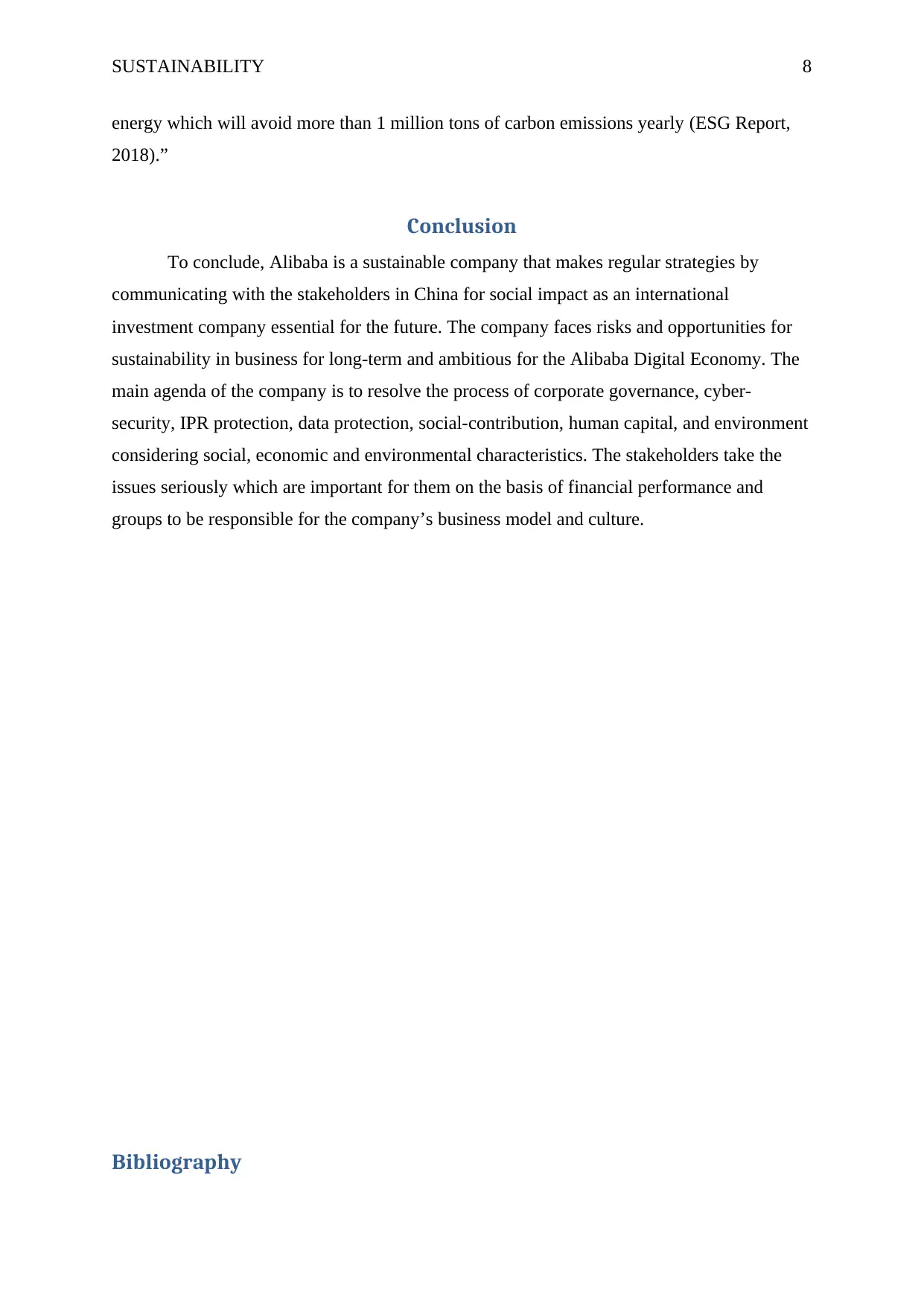
SUSTAINABILITY 8
energy which will avoid more than 1 million tons of carbon emissions yearly (ESG Report,
2018).”
Conclusion
To conclude, Alibaba is a sustainable company that makes regular strategies by
communicating with the stakeholders in China for social impact as an international
investment company essential for the future. The company faces risks and opportunities for
sustainability in business for long-term and ambitious for the Alibaba Digital Economy. The
main agenda of the company is to resolve the process of corporate governance, cyber-
security, IPR protection, data protection, social-contribution, human capital, and environment
considering social, economic and environmental characteristics. The stakeholders take the
issues seriously which are important for them on the basis of financial performance and
groups to be responsible for the company’s business model and culture.
Bibliography
energy which will avoid more than 1 million tons of carbon emissions yearly (ESG Report,
2018).”
Conclusion
To conclude, Alibaba is a sustainable company that makes regular strategies by
communicating with the stakeholders in China for social impact as an international
investment company essential for the future. The company faces risks and opportunities for
sustainability in business for long-term and ambitious for the Alibaba Digital Economy. The
main agenda of the company is to resolve the process of corporate governance, cyber-
security, IPR protection, data protection, social-contribution, human capital, and environment
considering social, economic and environmental characteristics. The stakeholders take the
issues seriously which are important for them on the basis of financial performance and
groups to be responsible for the company’s business model and culture.
Bibliography
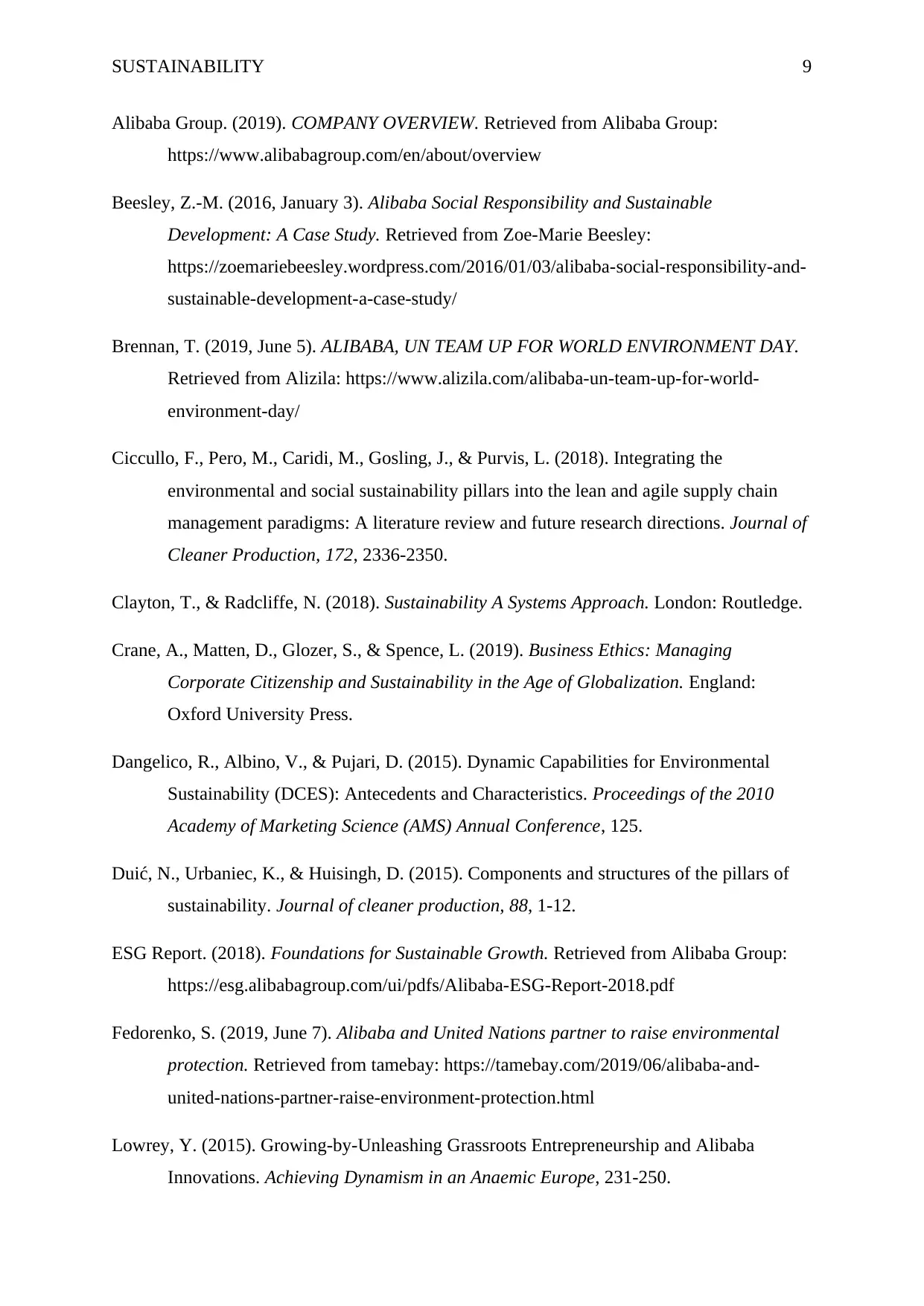
SUSTAINABILITY 9
Alibaba Group. (2019). COMPANY OVERVIEW. Retrieved from Alibaba Group:
https://www.alibabagroup.com/en/about/overview
Beesley, Z.-M. (2016, January 3). Alibaba Social Responsibility and Sustainable
Development: A Case Study. Retrieved from Zoe-Marie Beesley:
https://zoemariebeesley.wordpress.com/2016/01/03/alibaba-social-responsibility-and-
sustainable-development-a-case-study/
Brennan, T. (2019, June 5). ALIBABA, UN TEAM UP FOR WORLD ENVIRONMENT DAY.
Retrieved from Alizila: https://www.alizila.com/alibaba-un-team-up-for-world-
environment-day/
Ciccullo, F., Pero, M., Caridi, M., Gosling, J., & Purvis, L. (2018). Integrating the
environmental and social sustainability pillars into the lean and agile supply chain
management paradigms: A literature review and future research directions. Journal of
Cleaner Production, 172, 2336-2350.
Clayton, T., & Radcliffe, N. (2018). Sustainability A Systems Approach. London: Routledge.
Crane, A., Matten, D., Glozer, S., & Spence, L. (2019). Business Ethics: Managing
Corporate Citizenship and Sustainability in the Age of Globalization. England:
Oxford University Press.
Dangelico, R., Albino, V., & Pujari, D. (2015). Dynamic Capabilities for Environmental
Sustainability (DCES): Antecedents and Characteristics. Proceedings of the 2010
Academy of Marketing Science (AMS) Annual Conference, 125.
Duić, N., Urbaniec, K., & Huisingh, D. (2015). Components and structures of the pillars of
sustainability. Journal of cleaner production, 88, 1-12.
ESG Report. (2018). Foundations for Sustainable Growth. Retrieved from Alibaba Group:
https://esg.alibabagroup.com/ui/pdfs/Alibaba-ESG-Report-2018.pdf
Fedorenko, S. (2019, June 7). Alibaba and United Nations partner to raise environmental
protection. Retrieved from tamebay: https://tamebay.com/2019/06/alibaba-and-
united-nations-partner-raise-environment-protection.html
Lowrey, Y. (2015). Growing-by-Unleashing Grassroots Entrepreneurship and Alibaba
Innovations. Achieving Dynamism in an Anaemic Europe, 231-250.
Alibaba Group. (2019). COMPANY OVERVIEW. Retrieved from Alibaba Group:
https://www.alibabagroup.com/en/about/overview
Beesley, Z.-M. (2016, January 3). Alibaba Social Responsibility and Sustainable
Development: A Case Study. Retrieved from Zoe-Marie Beesley:
https://zoemariebeesley.wordpress.com/2016/01/03/alibaba-social-responsibility-and-
sustainable-development-a-case-study/
Brennan, T. (2019, June 5). ALIBABA, UN TEAM UP FOR WORLD ENVIRONMENT DAY.
Retrieved from Alizila: https://www.alizila.com/alibaba-un-team-up-for-world-
environment-day/
Ciccullo, F., Pero, M., Caridi, M., Gosling, J., & Purvis, L. (2018). Integrating the
environmental and social sustainability pillars into the lean and agile supply chain
management paradigms: A literature review and future research directions. Journal of
Cleaner Production, 172, 2336-2350.
Clayton, T., & Radcliffe, N. (2018). Sustainability A Systems Approach. London: Routledge.
Crane, A., Matten, D., Glozer, S., & Spence, L. (2019). Business Ethics: Managing
Corporate Citizenship and Sustainability in the Age of Globalization. England:
Oxford University Press.
Dangelico, R., Albino, V., & Pujari, D. (2015). Dynamic Capabilities for Environmental
Sustainability (DCES): Antecedents and Characteristics. Proceedings of the 2010
Academy of Marketing Science (AMS) Annual Conference, 125.
Duić, N., Urbaniec, K., & Huisingh, D. (2015). Components and structures of the pillars of
sustainability. Journal of cleaner production, 88, 1-12.
ESG Report. (2018). Foundations for Sustainable Growth. Retrieved from Alibaba Group:
https://esg.alibabagroup.com/ui/pdfs/Alibaba-ESG-Report-2018.pdf
Fedorenko, S. (2019, June 7). Alibaba and United Nations partner to raise environmental
protection. Retrieved from tamebay: https://tamebay.com/2019/06/alibaba-and-
united-nations-partner-raise-environment-protection.html
Lowrey, Y. (2015). Growing-by-Unleashing Grassroots Entrepreneurship and Alibaba
Innovations. Achieving Dynamism in an Anaemic Europe, 231-250.
Secure Best Marks with AI Grader
Need help grading? Try our AI Grader for instant feedback on your assignments.
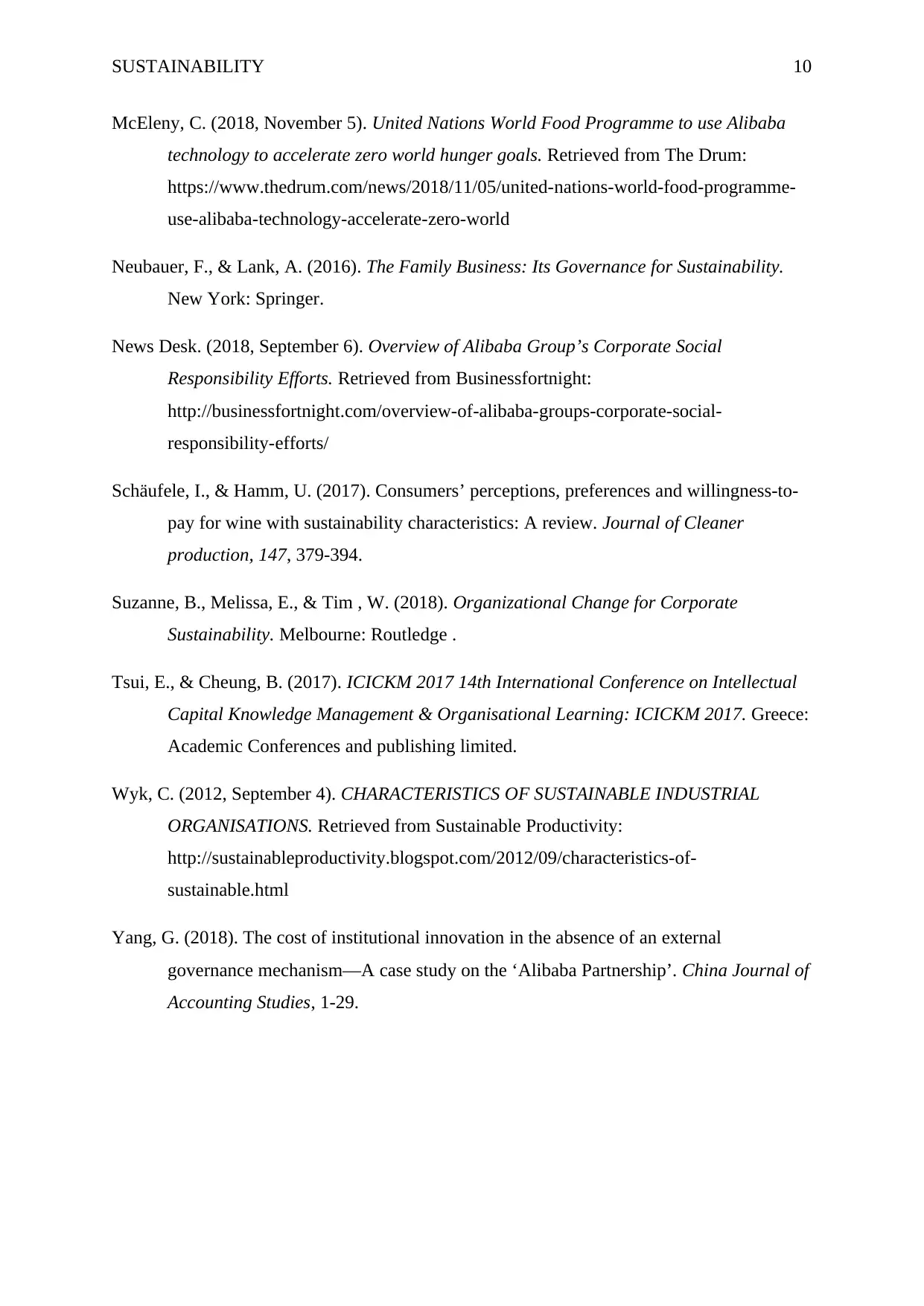
SUSTAINABILITY 10
McEleny, C. (2018, November 5). United Nations World Food Programme to use Alibaba
technology to accelerate zero world hunger goals. Retrieved from The Drum:
https://www.thedrum.com/news/2018/11/05/united-nations-world-food-programme-
use-alibaba-technology-accelerate-zero-world
Neubauer, F., & Lank, A. (2016). The Family Business: Its Governance for Sustainability.
New York: Springer.
News Desk. (2018, September 6). Overview of Alibaba Group’s Corporate Social
Responsibility Efforts. Retrieved from Businessfortnight:
http://businessfortnight.com/overview-of-alibaba-groups-corporate-social-
responsibility-efforts/
Schäufele, I., & Hamm, U. (2017). Consumers’ perceptions, preferences and willingness-to-
pay for wine with sustainability characteristics: A review. Journal of Cleaner
production, 147, 379-394.
Suzanne, B., Melissa, E., & Tim , W. (2018). Organizational Change for Corporate
Sustainability. Melbourne: Routledge .
Tsui, E., & Cheung, B. (2017). ICICKM 2017 14th International Conference on Intellectual
Capital Knowledge Management & Organisational Learning: ICICKM 2017. Greece:
Academic Conferences and publishing limited.
Wyk, C. (2012, September 4). CHARACTERISTICS OF SUSTAINABLE INDUSTRIAL
ORGANISATIONS. Retrieved from Sustainable Productivity:
http://sustainableproductivity.blogspot.com/2012/09/characteristics-of-
sustainable.html
Yang, G. (2018). The cost of institutional innovation in the absence of an external
governance mechanism—A case study on the ‘Alibaba Partnership’. China Journal of
Accounting Studies, 1-29.
McEleny, C. (2018, November 5). United Nations World Food Programme to use Alibaba
technology to accelerate zero world hunger goals. Retrieved from The Drum:
https://www.thedrum.com/news/2018/11/05/united-nations-world-food-programme-
use-alibaba-technology-accelerate-zero-world
Neubauer, F., & Lank, A. (2016). The Family Business: Its Governance for Sustainability.
New York: Springer.
News Desk. (2018, September 6). Overview of Alibaba Group’s Corporate Social
Responsibility Efforts. Retrieved from Businessfortnight:
http://businessfortnight.com/overview-of-alibaba-groups-corporate-social-
responsibility-efforts/
Schäufele, I., & Hamm, U. (2017). Consumers’ perceptions, preferences and willingness-to-
pay for wine with sustainability characteristics: A review. Journal of Cleaner
production, 147, 379-394.
Suzanne, B., Melissa, E., & Tim , W. (2018). Organizational Change for Corporate
Sustainability. Melbourne: Routledge .
Tsui, E., & Cheung, B. (2017). ICICKM 2017 14th International Conference on Intellectual
Capital Knowledge Management & Organisational Learning: ICICKM 2017. Greece:
Academic Conferences and publishing limited.
Wyk, C. (2012, September 4). CHARACTERISTICS OF SUSTAINABLE INDUSTRIAL
ORGANISATIONS. Retrieved from Sustainable Productivity:
http://sustainableproductivity.blogspot.com/2012/09/characteristics-of-
sustainable.html
Yang, G. (2018). The cost of institutional innovation in the absence of an external
governance mechanism—A case study on the ‘Alibaba Partnership’. China Journal of
Accounting Studies, 1-29.
1 out of 11
Related Documents
Your All-in-One AI-Powered Toolkit for Academic Success.
+13062052269
info@desklib.com
Available 24*7 on WhatsApp / Email
![[object Object]](/_next/static/media/star-bottom.7253800d.svg)
Unlock your academic potential
© 2024 | Zucol Services PVT LTD | All rights reserved.





